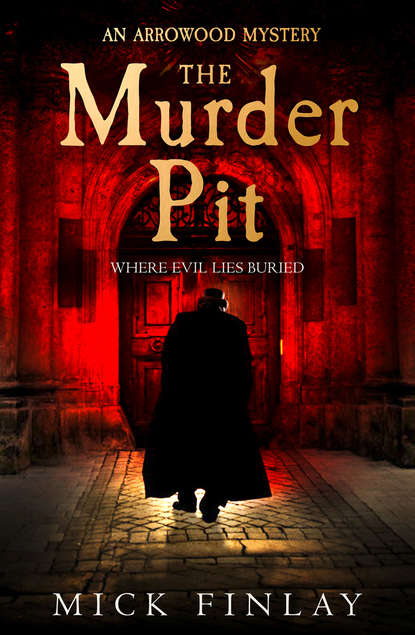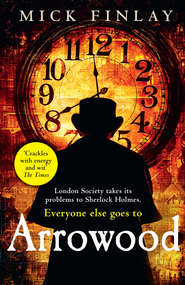По всем вопросам обращайтесь на: info@litportal.ru
(©) 2003-2024.
✖
The Murder Pit
Автор
Год написания книги
2019
Настройки чтения
Размер шрифта
Высота строк
Поля
We stood on the doorstep listening, the fog bunched thick around us. It was a song you’d often hear in the pubs near closing time, but never had I heard it sang so very fine and sad, so full of loneliness: ‘In the gloaming, oh my darling, when the lights are dim and low, and the quiet shadows falling, softly come and softly go.’ As it built to the refrain, the guvnor shut his eyes and swayed with the chords, his face like a hog at stool. Then, when the last line came, he started singing himself, flat and out of time, drowning out the lady’s mournful voice: ‘When the winds are sobbing faintly, with a gentle unknown woe, will you think of me and love me, as you did once long ago?’
I think it was the only line he knew, the line that spoke most direct to his own battered heart, and he ended in a choke and a tremble. I reached out to squeeze his fat arm. Finally, he opened his eyes and nodded for me to knock.
A broad, pink-faced fellow opened the door. The first thing you noticed was his Malmsey nose, round at the end and coated in fine fur like a gooseberry; beneath it the thick moustache was black though the hair around his bald scalp was white. He greeted us in a nervy voice and led us through to the front room, where a tall woman stood next to a pianoforte. She was Spanish or Portuguese or somesuch, dressed in black from head to toe.
‘These are the detective agents, my dear,’ he said, wringing his hands in excitement. ‘Mr Arrowood, Mr Barnett, this is my wife, Mrs Barclay.’
On hearing our names a warm smile broke over her face, and I could see from the way the guvnor bowed and put his hand flat on his chest that he felt humbled by the lady: by her singing, her deep brown eyes, the kindness in her expression. She bade us sit on the couch.
The small parlour was packed out with furniture too big for it. The pianoforte was jammed between a writing desk and a glass-fronted cabinet. The couch touched the armchair. A gilded Neptune clock took up most of the mantel, its tick ringing out maddeningly loud.
‘Now,’ said the guvnor, ‘how about you tell us your difficulty and we’ll see what we can do to help?’
‘It’s our daughter, Birdie, sir,’ said Mr Barclay. ‘She was married six months ago into a farming family, but since the wedding we’ve heard nothing from her. Nothing at all. No visits, no letters, not even this Christmas last. I’ve twice tried to call for her but they wouldn’t even let me in the house! Said she’s out visiting. Well, sir, it simply cannot be true.’
‘Surely young ladies visit?’ asked the guvnor.
‘She’s not the type to visit, sir. If you knew her you’d understand that. We’ve been driven wild with worry, Mr Arrowood. It’s as if she’s disappeared.’
‘Did you have a quarrel before the wedding? It can be a very upsetting occasion.’
‘She isn’t like that,’ answered Mrs Barclay. Against her husband’s nerves she was a woman of great calm. Her long face was tan; her black hair fell loose down her back. Three small moles dripped from one eye down the side of her cheek. Noticing me watching, her humble smile returned. ‘Birdie never quarrels. She’ll do what you say even if it hurts her, that’s why we’re so concerned. She’d never cut us off. We think they must be preventing her.’
‘Very worrying,’ said the guvnor, nodding his great potato head. His side-hair was tangled and stiff; his belly strained the buttons of his shabby astrakhan coat. He took out his notebook and pen. ‘Now, tell us about her husband. Leave nothing out.’
‘Walter Ockwell’s his name,’ said Mr Barclay. His hands flitched as if it irked him to speak of his son-in-law. ‘The family own a pig farm outside Catford. We don’t trust the man. He’s odd, and not in the usual farmer way either. I can’t describe it any better. Doesn’t meet your eye. We didn’t know it before the wedding but he’s had a spell in prison for clubbing a man half to death in a fight. The parson told me when I was last there. Hit him so hard on the side of the head the eye just exploded. Shattered the cavity, you see. The eye was hanging down his cheek on a bit of string.’ Mr Barclay shuddered. ‘Well, sir! That parson might have told us before the wedding, don’t you think? And if that wasn’t enough, it turns out he’s been married before. The poor woman passed over some two years past.’
The guvnor stopped writing and gave me a look.
‘How did she die?’ he asked.
‘A wagon fell onto her, that’s what the parson says. We went to the police, but they were no help. Sergeant Root told us Birdie’d likely see us when she was good and ready. That’s why we’ve come to you, sir. It could be he’s hurt her and they don’t want us to know.’
The guvnor’s face was grim. Gone was the warm smile.
‘And you haven’t heard from her even once?’
‘It’s as if she’s disappeared. She might be dead for all we know.’
‘Who else lives on the farm, sir?’
‘There are five of them. The mother’s bed-bound. Rosanna’s the sister, she’s not married, and Godwin the brother, and his wife Polly. It was the sister wouldn’t let me in both times. I asked for Walter but he was away in the north somewhere looking at pigs. There was no welcome there for me, I can tell you. I demanded she let me in but she out and out refused. What could I do? I told her to ask Birdie to visit us on a matter of urgency but I don’t know if she even got the message. Same with our letters. Do you see, sirs? Our daughter’s become a ghost!’
‘How did she meet her husband, if I may ask?’ asked the guvnor.
‘We had an introduction from an associate at my firm. We wanted a better match but her mind was set. And also—’ Here he glanced at his wife. ‘We weren’t sure another man would have her.’
‘Dunbar!’ she cried.
‘The agents must know everything, dear.’ He turned back to us, the pressure gone from his voice. ‘Birdie suffered some damage coming into this world and never quite developed fully. She needs a lot of guidance. The doctor called it amentia. Weak-minded, in other words. Walter’s not too far off either, I’d say. We both thought that, didn’t we, dear?’
‘She’s mentally defective?’ asked the guvnor, writing in his pad.
‘She’s only mild,’ said Mrs Barclay. ‘She understands perfectly well though she’s a bit slow with her talking. You wouldn’t know from looking at her and she’s a good worker: they’ve no cause for complaint there. She’ll do just what she’s told.’
‘And what would you like us to do?’
‘We want you to bring her back home,’ replied Mr Barclay, stepping over to his wife but then changing his mind and retreating to the fire.
‘What if she doesn’t want to be brought, sir? What then?’
‘She doesn’t know her own mind, Mr Arrowood,’ said Mr Barclay. ‘She’ll believe anyone, do whatever they say. If they’ve turned her against us, we need to get her away from them. If we can get her back here we’ve a doctor who’ll swear that the marriage’s invalid due to her being mentally unsound. We can have it annulled.’
‘You want us to kidnap her, Mr Barclay?’ asked the guvnor in his sweetest voice.
‘It’s not kidnapping if it’s for the parents.’
‘I’m afraid it is, sir.’
‘At least find out if she’s safe,’ said Mrs Barclay, her voice a-quaver. She dabbed the corners of her eyes with a handkerchief. ‘That she’s not mistreated.’
The guvnor nodded and patted her hand. ‘We can do that, madam.’
He tapped me on the knee.
‘The price is twenty shillings a day plus expenses,’ I said. ‘Two days in advance for a case as this.’
As I spoke, the guvnor hauled himself to his feet and stepped over to inspect a picture of a sailing ship hanging by the door. Though he was tight with his money and often short of it, Arrowood never liked asking for payment. He had a high opinion of himself, and was ashamed to be the sort of gentleman who needed compensation for his services.
‘If it only takes a day we’ll repay you what we haven’t used,’ I said as Mr Barclay pulled a purse from his waistcoat and counted the coins. ‘We’re honest. No one’ll tell you any different.’
When it was done, the guvnor turned away from the picture.
‘How long have you lived here, madam?’
‘How long?’ asked Mrs Barclay, glancing at her husband.
‘Oh, a few years,’ he said, leaning his elbow on the high mantelpiece then jerking if off again as if he’d landed it on a hot plate. ‘Perhaps five.’
‘Five years,’ nodded the guvnor.
‘Yes, it’s a respectable area. Kipling’s brother lived on this street, you know.’
‘Well, well, how wonderful,’ muttered the guvnor. ‘May I ask what your profession is, sir?’
‘I’m senior clerk with an insurance agent, sir.’
‘Tasker and Sons,’ said his wife. ‘Dunbar’s been with them twenty-two years. And I’m a singing instructor.’
Другие электронные книги автора Mick Finlay
Arrowood




 0
0






